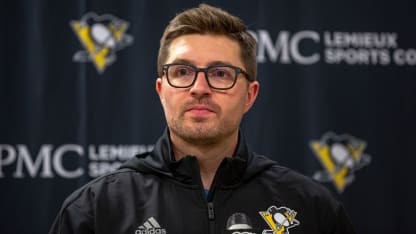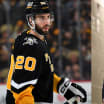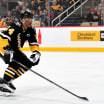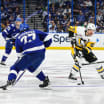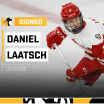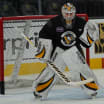After Tuesday’s 3-2 overtime loss to Tampa Bay – where the Penguins surrendered a two-goal lead in the third period – Head Coach Mike Sullivan said they needed more guys to compete harder and pay more attention to detail, and needed to take more pride in playing defense.
President of Hockey Operations and GM Kyle Dubas spoke more about what the Penguins are looking for in that regard during the latest edition of the GM Show, which airs biweekly.
“I think when you look at the actual problems and the way the goals go in the net – the two that tie it, they're both down low plays around our net,” Dubas said. “We need to close those out and end them and help our goaltenders out. Goaltenders need to make stops, and we need to make plays to get back onto offense. After the first period last night, the shots were something like, 25 to 10. It's not a real recipe (for success), especially against a highly talented team like Tampa.”
Tristan Jarry was between the pipes for Pittsburgh in that game. His difficult start to the season has been well-documented, with the netminder doing a two-week conditioning stint in Wilkes-Barre/Scranton of the American Hockey League to work on finding his game. Dubas talked with Jarry about it, determining it would be in his best interests.
But as Dubas said today, that wasn’t a magical solution. Jarry’s had some good stretches in his two games since returning, building some confidence at the end of a 6-2 loss to the Blue Jackets over the weekend before starting strong in the matchup with the Lightning. But there’s still a ways to go when it comes to Jarry, a two-time NHL All-Star, rediscovering his form and playing to his potential.
“It's not just going to happen overnight,” Dubas said. “He's put the work in to try to move himself back. Not the night he wanted Friday in Columbus. Better last night, but can't close it out. Needs to start closing out the games and finding way to get them across the line. That's the nature of the business that he's chosen being a goaltender. So, it's on us to help him, and it's on him to continue to push his way through it.”
Last week, the Penguins traded Lars Eller to Washington – where he helped the Capitals win the Stanley Cup in 2018 – for a third-round pick in 2027 and fifth-round pick in 2025. Dubas said the move fit into Pittsburgh’s longer-range plan. That’s repositioning themselves from a team always looking to acquire older, more proven players and expend future capital to the team that's looking to acquire those “and build up our war chest, per se,” Dubas said.
So, the Penguins started having conversations about veteran players like Eller in the summer. When the group reached a point where they felt good about their center depth, both here and in WBS, Dubas was able to orchestrate a deal with Washington.
“We appreciate everything Lars did here, but we just think it's in the best interest of our team to continue to give those younger players opportunity and see what they've got, see they can bring some energy and a boost to our team,” Dubas said.
Dubas knows that some people would prefer their team’s situation to be placed in a “very binary” position. “Either they want to say contending or whatever phrase you want to use – retooling, retool on the fly, replenish, renew, rebuild – whatever you want to say. I think every situation is unique in every different marketplace.”
Dubas referenced his time in Toronto as a member of the Leafs management team, starting as an assistant GM under the legendary Lou Lamiorello. He talked about how they moved out many existing players—including Phil Kessel to Pittsburgh—but also kept a lot of good young players who helped the transition for the core of that team now, when the likes of Auston Matthews, Mitch Marner, and William Nylander were ready to move in.
“I'm a firm believer that if you throw everything overboard, you really have to be careful what you wish for, because you could go a long time before you're back to being a competitive and contending team,” Dubas said. “So, our focus is on trying to, as I always say, as urgently as possible bring in (what we can) using whatever means we have.”
Currently, it’s a lot of draft capital—10 picks in 2025 and 2027, along with nine in 2026. They can use it to draft players, acquire prospects, and be in the mix whenever good young players become available.
“Previously, I don't think that's been the position here. So, we just have to keep at it,” Dubas said. “I understand that can bring with it a lot of criticism and angst, but we're steadfast in our plan and vision for the team, and that's what we're going to execute every day.”
The Penguins are in the midst of a difficult stretch. They’ve gone 1-2-2 in their last five and ended up on the wrong end of the score in six of the last eight. But they are also in a part of the schedule where most of their games are at home – 11 of 14, to be precise. The Penguins also have more practice time coming up.
“So, can we rectify a lot of the issues that have cropped up in our game over the year?” Dubas said. “We've talked about being able to close out games, the defensive side of our game – our structure in-zone, neutral zone, tracking back, what we're giving up in transition. Can we get all that stuff rectified?
“Can our younger players, who are part of the group, can they continue to grow?
“Can we execute upon those and can we use this time where we're at home, have practice time, our fans behind us and pushing us? Can we use that to take steps competitively? Do we have what it takes to push through, compete, grow, develop? That, to me, is what I'm watching for.”

